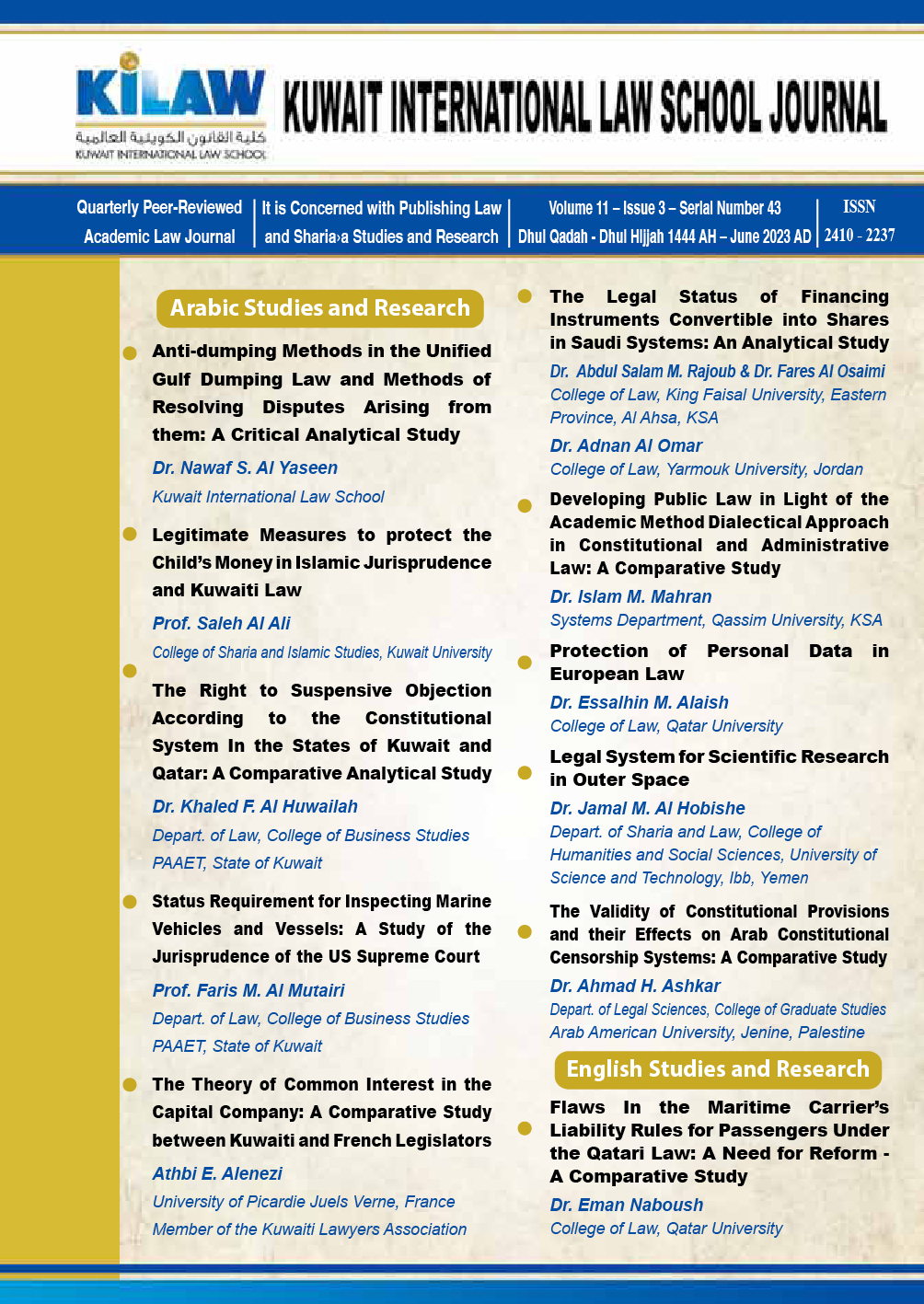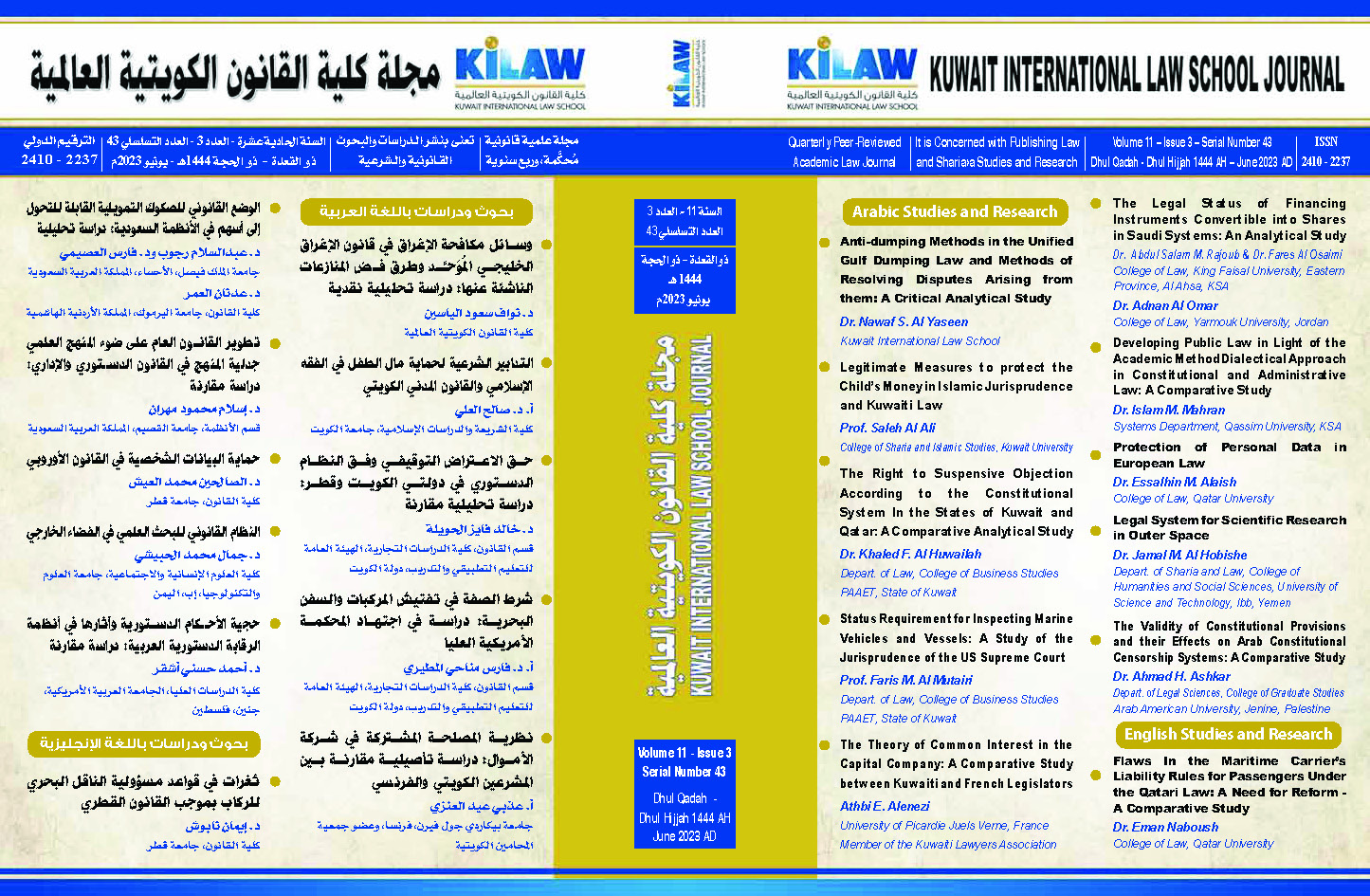| Volume 11 |
Dhul Qadah – Dhul Hijjah 1444 |
| Issue 43 | June 2023 |
| ISSN 24102237 |

Editorial
The National Assembly and Legislative Achievement: Factors and Indicators
By: Prof. Badria A. Al-Awadi
Editor-in-Chief
The National Assembly and Legislative Achievement: Factors and Indicators
Chief-in-Editor Prof. Badria A. Al-Awadi
Legislative and parliamentary councils constitute one of the most important constitutional and political institutions in the entire world because they are the highest expression of the will and sovereignty of the people, and in them and through them decisive decisions are taken regarding the people’s present and future, which represents the most prominent manifestation of democracy and political participation. Therefore, the demands and struggles for the liberation and independence of countries were mostly linked to the call for the establishment of parliaments and representative councils, and the State of Kuwait was no exception to this, as the establishment of the Legislative Council was a historical demand dating back to the beginning of the twentieth century, and it went through stages that piled on top of each other, crowned by consensual reforms that included writing a constitution. The country was established through an elected Constituent Assembly, the enactment of an election law, and the selection of the first National Assembly in 1963. Since the beginning of constitutional life, the Assembly has become an effective institution and a hub around which events, procedures and developments revolve; and candidates from different sects compete to win their seat. In light of the constitutional powers that include legislation and control, as well as parliamentary and political practices on the ground, the performance of the National Assembly varied from time to time depending on the internal factors of the Assembly and the surrounding circumstances, but legislative achievement was and always remains the main factor in the evaluation. The Council was often blamed for focusing on control at the expense of legislation, but the matter has changed recently.
We will discuss this change in the situation through the official numbers and statistics distributed by the Council’s bodies, and then we will present some of the factors and indicators that reflect it, as follows:
The 2022 Assembly (17th legislative term) has set a record number of parliamentary activities in the first 100-day period. The seventeenth legislative term came at the top of the last four terms in terms of achievements in the first 100 days:
– In terms of approving laws, the seventeenth legislative term completed 120 pieces of legislation during the first hundred days, which varied between six general laws, 41 budgets, and 73 final accounts, while no laws were approved in the fourteenth and sixteenth chapters in the same period, while the 2016 Council approved (Legislative Chapter Fifteen) two laws and only one budget.
– In terms of parliamentary activities, the 2022 Parliament recorded a record number during the first hundred days compared to the previous three legislative assemblies, as representatives submitted 1,816 questions in that period, while in the 2013
(fourteenth) Assembly, representatives submitted 446 questions, compared to 771 in the 2016 Assembly (The fifteenth), and 1,520 questions in the 2020 Council (the sixteenth legislative term).
– In terms of approving laws, the seventeenth legislative term completed 120 pieces of legislation during the first hundred days, which varied between six general laws, 41 budgets, and 73 final accounts, while no laws were approved in the fourteenth and sixteenth chapters in the same period, while the 2016 Council approved (Legislative Chapter Fifteen) Two laws and only one budget.
– In terms of parliamentary activities, the 2022 Parliament set a record number during the first hundred days compared to the previous three legislative assemblies, as representatives submitted 1,816 questions in that period, while in the 2013 (fourteenth) Assembly, representatives submitted 446 questions, compared to 771 in the 2016 Assembly (The fifteenth), and 1,520 questions in the 2020 Council (the sixteenth legislative term).
– It came at the top of the chapters in terms of submitting proposals for laws in Chapter Seventeen, as 525 law proposals were submitted during the first hundred days from the beginning of the legislative semesters, while 212 law proposals were submitted in Chapter Fourteen, 390 in Chapter Fifteen, and 433 in the sixteenth legislative council.
– The 2022 Assembly (the seventeenth legislative term) topped the legislative chapters in terms of willing proposals, as representatives submitted 768 willing proposals, compared to 285 in the fourteenth legislative term, 406 willing proposals in the fifteenth legislative term, and 357 in the sixteenth legislative term.
– In terms of submitting incoming messages, the 2022 Council came in the lead with 93 incoming messages, compared to 4 messages in the 2013 Council, and 36 messages in the 2016 Council, while no messages were submitted during the first 100 days in the 2020 Council.
– Regarding the meetings of the permanent and temporary committees, the 2022 Council topped the legislative chapters, in terms of the number of meetings, so the number of committee meetings in the seventeenth legislative term reached 238 meetings, compared. to 81 meetings in the fourteenth term, 184 meetings in the fifteenth term, and 174 meetings in the sixteenth term.
– The 2022 Council is the council with the most formations of parliamentary committees, as it formed 28 permanent and temporary committees, compared to 15 committees in the 2013 Council, 22 committees in the 2016 Council, and the same in the 2020 Council. It topped the seventeenth term in the number of committee assignments, the assignments of the Audit Bureau, and the submission of recommendations.
In a quick reading of these results, they constitute an unprecedented legislative achievement, which is mainly due to the quality of the Council members, who showed the spirit of initiative, and to the political will of the executive authority, and to the joint consensus on priorities and a legislative map, and to cooperation and coordination instead of discord and conflict. It is true that some of the legislation that was issued included shortcomings and flaws, due to haste and failure to activate sound legislative tools through the assistance of committees, advisors, and specialists, but that does not cast doubt on the size of the achievement, its impact, and its approach, nor does it diminish its material, legislative, and moral value.
What has been achieved indicates that the cooperation, consensus, and focus of the legislative and executive authorities on national and popular priorities is a true recipe for achievement, construction, and the desired development, and for preserving the interests of the country and its people, which are the environment and values urged by the Constitution and its explanatory memorandum, which must be taken into account and from which the conscious and rational practices of the various parties should proceed. This stage has restored the real glow and radiance of the National Assembly’s proactive legislative role, which has stimulated the Council of Ministers to work and take initiative because it is the one that dominates the state’s interests, formulates the government’s general policy, follows up on its implementation, and supervises the progress of work in government departments in accordance with Article (123) of the Constitution. It also spread to the nation a spirit of optimism, hope and satisfaction.
Content
Arabic Studies and Research
Anti-dumping Methods in the Unified Gulf Dumping Law and Methods of Resolving Disputes Arising from them: A Critical Analytical Study
Dr. Nawaf Saud Al Yaseen
Assistant Professor
Kuwait International Law School
Legitimate Measures to protect the Child’s Money In Islamic Jurisprudence and Kuwaiti Law(*)
Prof. Saleh Al Ali
Department of Comparative Jurisprudence and Sharia Policy
College of Sharia and Islamic Studies, Kuwait University
The Right to Suspensive Objection According to the Constitutional System in the States of Kuwait and Qatar: A Comparative Analytical Study
Dr. Khaled F. Al Huwailah
Assistant Professor of Public Law,
Department of Law, College of Business Studies,
PAAET, State of Kuwait
Status Requirement for Inspecting Marine Vehicles and Vessels: A Study of the Jurisprudence of the US Supreme Court
Prof. Faris Manahi Al Mutairi
Associate Professor of Criminal Law
Depart. of Law, College of Business Studies
PAAET, State of Kuwait
The Theory of Common Interest in the Capital Company: A Comparative Study between Kuwaiti and French Legislators
Athbi Eid Alenezi
PhD Candidate in Private Law, University of Picardie Juels Verne, France
& Registered Lawyer before the Court of Cassation and the Constitutional Court
in the State of Kuwait
The Legal Status of Financing Instruments Convertible into Shares in Saudi Systems: An Analytical Study
Dr. Abdul Salam Rajoub
(Principal Researcher)
Associate Professor of Commercial Law
College of Law, King Faisal University, Eastern Province, Al-Ahsa, KSA
Dr. Fares Al Osaimi
(Associate Researcher)
Assistant Professor of Commercial Law
College of Law, King Faisal University, Eastern Province, Al-Ahsa, KSA
Dr. Adnan Al Omar
(Associate Researcher)
Associate Professor of Commercial Law
College of Law, Yarmouk University, The Hashemite Kingdom of Jordan
Developing Public Law in Light of the Academic Method Dialectical Approach in Constitutional and Administrative Law A Comparative Study
p style="text-align: right; margin-bottom: 0px;">
Dr. Islam Mahmoud Mahran
Assistant Professor of Constitutional and Administrative Law
Systems Department, Qassim University, KSA
Protection of Personal Data in European Law
Essalhin Mohamed Alaish
Associate Professor of Civil Law
College of Law, Qatar University
Legal System for Scientific Research in Outer Space
Dr. Jamal Mohammed Al Hobishe
Assistant Professor of Public International Law
Head of the Department of Sharia and Law, College of Humanities and Social
Sciences, University of Science and Technology, Ibb, Yemen
The Validity of Constitutional Provisions and their Effects on Arab Constitutional Censorship Systems: A Comparative Study
Dr. Ahmad Hosni Ashkar
Assistant Professor of Public Law, Head of the Department of Legal Sciences,
College of Graduate Studies, Arab American University, Jenine, Palestine
English Studies and Research
Flaws In the Maritime Carrier’s Liability Rules for Passengers Under the Qatari Law: A Need for Reform – A Comparative Study
Dr. Eman Naboush
Assistant Professor of Commercial Law
College of Law, Qatar University

